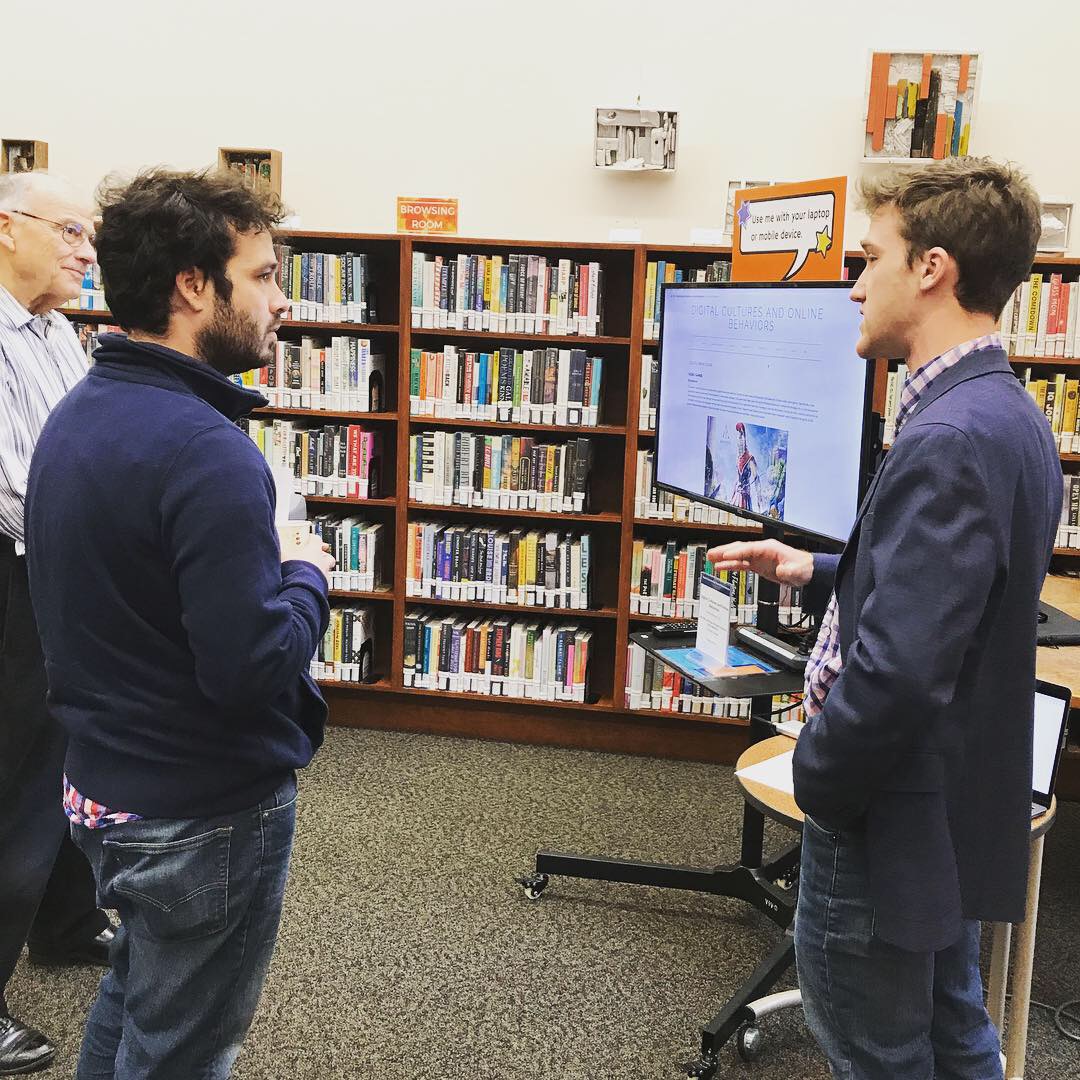
Daniel Reeves ’19 presented on Digital Cultures and Online Behavior for his SOC 250 course under the Digital Literacy grant (Photo courtesy of Musselman Library)
By Phoebe Doscher, Staff Writer
On February 13, the Digital Scholarship Summer Fellows and students participating in courses under a Digital Literacy grant presented their digital research in Musselman Library.
Students presented on a wide variety of topics, from historical events to digital culture in our society. Each student shared their research topic and allowed viewers digital access to their research using their digital public interfaces.
Gauri Mangala ‘21, one of the Digital Scholarship Summer Fellows, presented “Remembering Gettysburg: From Memorial to Stage.” In her research, Mangala discovered the history of storytelling in Gettysburg and tracked the town’s history from the Battle of Gettysburg through the current attractions, including reenactments and ghost tours.
Mangala learned that Gettysburg is a place for storytelling, where residents of the town, students at the college, and tourists all share folklore of the war and ghosts. She added that the town is not only for history buffs, and the entertaining stories make the history accessible to any visitor.
Ivana Lopez-Espinosa ‘19 focused on the history of Gettysburg College, rather than the town as a whole, in her presentation: “Gettysburg College: A Diversity Story.” Lopez-Espinosa conducted research on the history of diverse enrollment at Gettysburg College, including black, female, and deaf students, for instance. She created a timeline of the milestones regarding the first students to be enrolled and to graduate.
Lopez-Espinosa uncovered that some minorities were listed as “international” students, regardless of their birthplace in America. She also learned that the history of minority enrollment, and lack of documentation are not unique to Gettysburg and are common among other liberal arts colleges. She compiled estimates that she hopes will spark further conversations about the issue, potentially at other institutions.
Augusta Pendergast ‘19 also researched Gettysburg College in her project called, “How Do We Fit In?: A Look at Gettysburg College Culture Through the Modern and Postmodern Eras.” Pendergast studied sources such as The Mercury, the school’s literary magazine, to see how themes of self and belief, for example, are expressed in Gettysburg’s history, throughout the modern, post-modern, and contemporary periods. Pendergast rooted her research in philosophy, with the aim to discover how these eras impact the present-day understanding of ourselves.
Christina Noto ‘19 studied “The Boys are Marching: A Digital Analysis of Civil War Sheet Music.” Noto analyzed aspects of the civil war song “Tramp! Tramp! Tramp!” including its cover and lyrics. She also studied the composer and publishing company to learn the historical significance of the song. Derived from an essay she wrote for the course Gender in the American Civil War, Noto compiled her findings in a digital site, and asks for feedback from viewers to continue to refine her research.
Through the History 301 course, Introduction to Public History with Dr. Jill Titus, Lillian Shea ‘21 and Cameron Sauers ‘21 conducted research on “Gettysburg Cyclorama: A Digital Annotation.” The pair presented their digital interface that includes a digital annotation of the painting, an interactive timeline, and a series of essays detailing specific aspects of the piece. Shea and Sauers emphasized the importance of digital history throughout their presentation, since their research is in an accessible site with the ability to reach a wide audience.
Dr. Alecea Standlee’s Sociology 250 course Digital Cultures and Online Behavior was the focus of Daniel Reeves’s ‘19 presentation of the same name. Reeves presented on the research conducted by all the students in this class regarding the ramifications of digital media. The class created a site that compiles their research on a variety of topics, from surveillance to technological power. Although Reeves spoke for his peers, his research topic was conflict, which covered areas of cyberbullying and other technological violence. The site ultimately raises awareness of the impact of online behaviors.
Students’ digital research projects in conjunction with the HIS 301 and SOC 250 courses are supported by a Digital Literacy grant from the Johnson Center for Creative Teaching & Learning. The Musselman Library Digital Scholarship Summer Fellows are supported by the Andrew W. Mellon Foundation.
